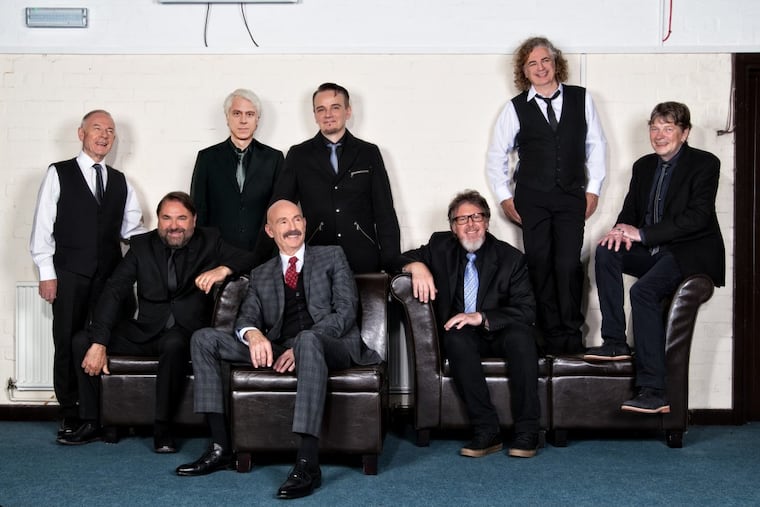King Crimson: A band creative even in its mistakes
This is their first U.S. tour in three years.

When it comes to truly progressive rock, Robert Fripp, of the consistently evolving King Crimson, is progenitor, architect, and the genre's greatest exponent.
His is not the whimsical bloat and flightily picturesque lyricism of so many bands that followed. Nor has Fripp, who has played the role of guitarist and principal composer, or his revolving crew of musicians bothered to continue with the sinister Mellotron-driven landmark album In the Court of the Crimson King. Only an ominous sense of foreboding, an ice-dry sense of humor, a mathematical precision, and uncompromising drive can be detected from past Crimsons to the present-day octet known as the Double Quartet, which will be at the Merriam Theater on Thursday and Friday.
"King Crimson is certainly different than any band I've been in, and Robert has written the book on some of the best ways to run a band, to have it be truly progressive," says bassist-composer Tony Levin. Along with playing in several Crimson chapters, Levin has gigged with Peter Gabriel, Lou Reed, David Bowie, Paul Simon, his own Stick Men, and the Levin Brothers (with his pianist-brother Pete). After 2017's Crimson shows, he'll hit a progressive rock cruise, "Cruise to the Edge," and "a music camp I've come to love, 'Three of a Perfect Pair Camp,' " in August 2018, based upon his Fripp collaborations.
"The band now is great at challenging itself and has a conscientious approach to working hard on our repertoire," says Levin (Fripp hasn't given interviews in decades). "I can't say that that is the reason I'm in the band — I joined, back in 1981, simply because some great musicians wanted to share music with me, but that's a special opportunity for any musician."
What Levin finds in common with all the Crimson incarnations is the challenge of continuing to try to innovate. "We challenge ourselves as a band, and also as individual players, to not play the way we did before — even if it's the same pieces — and to look at our classics as if it had just been written. So it's a stimulating experience," he says. "To me, it's a band that's truly progressive." That this current Crimson assemblage includes three drummers at stage's lip with no traditional front man is just another glimpse as how forward-thinking this lot is in Levin's mind: "Certainly is unique."
Fripp's current chapter does indeed tackle music from previous iterations, including the earliest ones. "I wouldn't say there's a big plan for what we play," says Levin about what's added to a live repertoire. "We look at the pieces as if they're freshly written, not sacredly reproduced. For me, playing bass parts, it's a fun challenge trying to stay true to what's special about [bassist-vocalist's] Greg Lake's part or John Wetton's, but also putting myself into the part, because it's not that band, and I'm not that player."
Mel Collins is that player, just as he was a saxophonist, flautist and Mellotron-ist for the band from 1970 to 1974, and again from 2013 to the present. After Collins was asked by Crimson and ex-Crimson members to be in a cover band of — what else? — Crimson material called 21st Century Schizoid Band, "Robert called me to offer his blessing for the band and to apologize for all the mean things he had said to me 30 years previously, thus bringing about the healing process between us," says Collins.
Collins says that in the 1970s, Fripp "was difficult to work with," leading to his departure from the band. But when Fripp reached out again, Collins returned. "He always had faith in my creativity and wouldn't tell me what or how I should play a particular piece or solo."
"Robert's exact words to me were `Mel, I have a wheeze you may be interested in,' " Collins says. "Look where we are today, three years later."
Beyond past problems, Collins says musical freedom and audacious musicianship are the reasons he is with Fripp. "This was all written down somewhere in that great book called Fate and its Consequences or something like that," jokes Collins. "This King Crimson band that I am in, a King Crimson of which Robert and all of us are very proud of, has allowed me to play probably the best music I have ever played live before in my career. The standard of musicianship is outstanding, and even the mistakes prove creative."